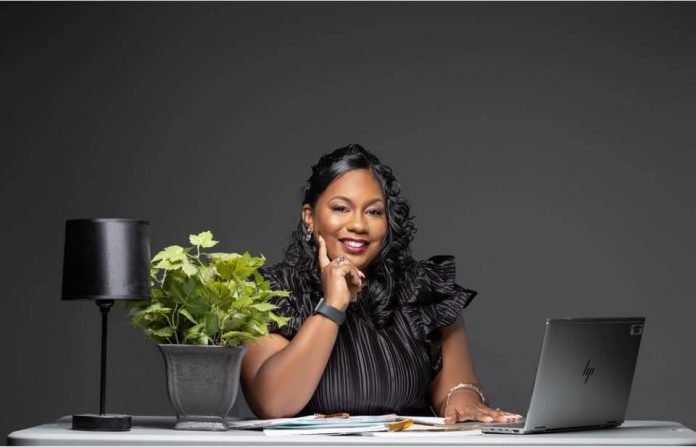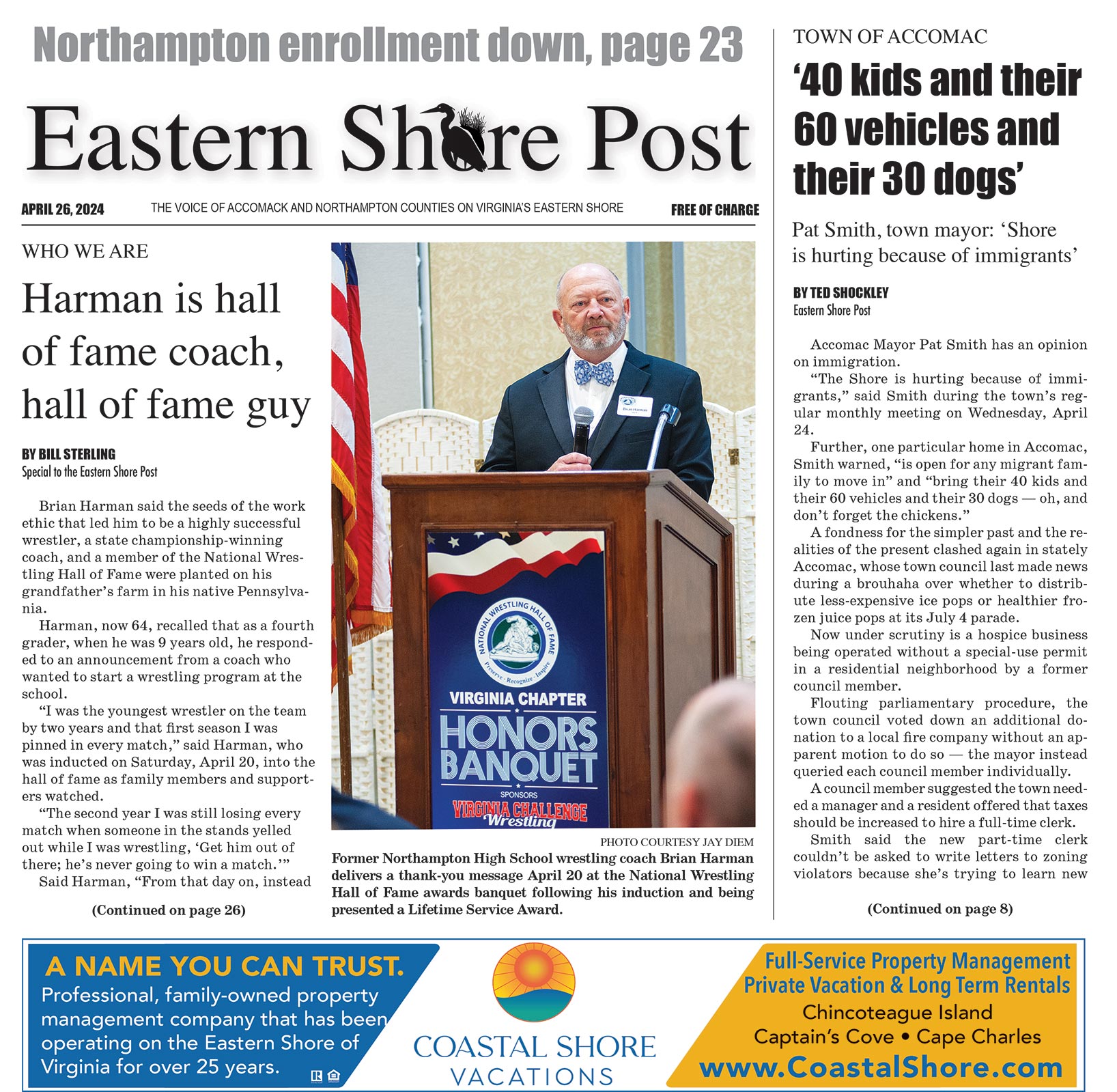By Stefanie Jackson – Frances Bailey is an empowered woman who recovered her lost hope and is not only helping other women and men find purpose in their lives but is teaching them how they can help others, building a chain of strong individuals with a global reach.
Bailey, who lives in Melfa, is a life coach who holds multiple degrees and certifications and is now developing her own school to train life coaches, but it took many years of struggles before she reached that point.
The future had looked promising in 2008 when she was a student of Eastern Shore Community College and member of the Phi Theta Kappa honor society. She earned an associate degree and received a $30,000 college scholarship; she chose Virginia Wesleyan University and planned to major in criminal justice and become an investigator.
She had completed about one-and-a-half years of college when she was hit by multiple obstacles that derailed her life: her mother fell ill, Bailey got divorced, and she fell into alcohol addiction and depression.
“I was in a down period of my life. … I kind of just threw my plans away,” Bailey said.
She moved back to the Eastern Shore and went to work at Perdue Farms.
Bailey’s life started turning around after she rekindled her relationship with church and God, and she discovered a desire to help people who had no hope, she said.
She resumed her college studies online through Walden University and completed both her bachelor’s and master’s degrees.
She also took classes remotely through an academy based in Chicago. Over the course of about 32 weeks, Bailey earned multiple certifications including life coach, life recovery, empowerment coach, mental health coach, and Christian counseling. She also received a certification in executive leadership from another institution.
After she became certified, Bailey started doing one-on-one coaching – “anything in life I had to overcome to reach goals,” she said.
The late Thomas J. Leonard, a financial planner, is credited with developing the concept of life coaching and starting to build the industry, which he originally called “life planning,” in the 1980s.
According to long-time life coach Wendy Buckingham on her website, Life Coaching Professionally, Leonard perceived that his clients were interested in more than financial planning; they wanted help planning and organizing their lives and setting and achieving personal and professional goals, and the concept of life coaching was born.
In the early 1990s, Leonard founded both Coach U, the first school for training life coaches, and the nonprofit International Coaching Federation, which establishes life coaching standards and codes of ethics and provides both accreditation for life coaching schools and credentials for graduates of those schools.
(ICF is a 501(c)(6), an organization similar to a chamber of commerce in that it seeks to improve the business climate and help businesses profit but does not profit itself.)
The life coaching industry is still relatively new, as are the organizations that provide accreditation to the schools that train life coaches.
The CLS Reflection Academy, through which Frances Bailey received her coaching and counseling certifications, is accredited through the Governing Accreditation Council of Professional Career Schools, she noted. According to the academy’s website, it is also accredited by the Christian College Accreditation Commission International, which was established in 2010.
The training Bailey received through the academy prepared her to help clients with a wide variety of personal and professional issues from building self-esteem to improving credit.
As a life coach, she doesn’t have the answers to all of life’s problems; rather, she is a resource for her clients, someone who can “connect the dots to whatever they need,” Bailey said.
For example, a client trying to build a new career might ask for help writing a resume. Bailey doesn’t specialize in resume writing, but she could refer her client to someone who does.
She also works as a mentor or “accountability partner,” someone who checks in regularly to talk with clients, encouraging them and ensuring they are taking steps toward their goals.
According to the Financial Express website in 2018, Magdalena Mook, chief executive officer and executive director of ICF, explained that a life coach’s role is to ask questions, listen, be objective, and “challenge the client’s blind spots and foster shifts in thinking that reveal fresh perspectives.”
The ICF commissioned a study in 2015, conducted by PricewaterhouseCooper Research, which revealed that North America alone had about 17,500 professional coaches, and its life coaching industry generated revenues nearing $1 billion.
A 2017 study for ICF by the same research firm showed rapid growth of the life coaching industry in India. More than half of people in India had consulted a life coach and 97% were satisfied with the experience, the study claimed.
One satisfied customer, Zelam Chaubal, an Indian tour operator, said her life coach “helped me turn my small family-run business into an over 1,000-employee organization,” according to the Financial Express.
An Indian life coach’s fee per session could be as low as 10,000 rupees or as high as 100,000 rupees – approximately $129 to $1,290.
Bailey’s fees fall on the low end of the scale; she considers the financial situations of people who may be interested in her coaching services and tries to make the prices reasonable.
A potential client can book a 15-minute consultation to decide if working with a life coach is the right choice before the client commits to multiple coaching sessions.
Bailey provides discounts to clients seeking long-term coaching commitments and students who are pursuing multiple coaching certifications.
Bailey saw her business go global during the COVID-19 pandemic that necessitated the proliferation of online business and education.
She offers her services both in person and virtually but noted that virtual learning is more effective for many of her clients, who like that they can pop in their earbuds and attend a Zoom class or take online quizzes.
Bailey gets many of her clients by word-of-mouth, but she also has made connections through her social media presence on Facebook, Instagram, and LinkedIn.
She has clients as nearby as Onancock and Wachapreague and as far away as Barbados, Nigeria, and New Zealand.
Bailey is looking forward to July, when the academy through which she received her certifications will hold a mass graduation in person in Chicago for about 300 students worldwide, many of whom she trained.
Some of her former students shared personal insights into the reasons why life coaching and similar fields have become so popular with coaches and clients alike.
Tiara Johnson, formerly of Nassawadox, said she drew the inspiration to become a counselor from “my Christian lifestyle, my walk.”
“I realized at a very young age that I had a calling all my life, and … I ran for a very long time.”
“I began to get serious with my walk, and for years I always wanted to be a Christian counselor,” Johnson said.
Bailey’s Christian counseling course was an accessible way for Johnson to pursue her goal.
She and Johnson met via Zoom video conferencing for about an hour per week. Bailey also provided pre-recorded lessons that Johnson could listen to anytime. Within about four weeks, Johnson passed her test and attained her certification.
Johnson, who now lives in Texas, recently became an ordained minister and plans to work in both Christian ministry and counseling.
Maria Knox, of Oak Hall, earned her certifications as an executive leadership coach and a Christian counselor “to properly serve the community” in every role she plays, from a school bus driver to a member of a local cheerleading group and a personal consultant.
Her desire was “to have the proper education to help get people to where they need to be at in life. … This will help me be able to help somebody else,” she said.
Knox believes the coaching and counseling format that she and others follow is appealing to clients because it is more private than a visit to a therapist’s office.
“Some people are afraid to go to a counselor or … center because of what’s on the outside or people watching you,” she said.
One of her coaching methods is holding group study sessions on Zoom. “We talk about some of the things that we face throughout the week, and we talk about how we could better react to some things versus the reaction that we took,” Knox said.
She enjoyed learning from Bailey via Zoom, particularly the one-on-one instruction and ability to ask questions. Knox called the experience better than being in a classroom.
Tiara Davis is a nurse who became a certified life recovery coach and Christian counselor through Bailey’s teaching.
Davis volunteers in her community and has been involved with local dance teams. She became accustomed to people confiding in her and was acting as an informal coach or counselor, so she pursued certification so she could respond to the issues presented to her in a more professional manner, she said.
Davis said there is a “fine line” between a coach or counselor and a mental health therapist. A coach or counselor is there to listen – “you go there to let it all out … and you can have a breath of fresh air.”
A Christian counselor can study Scripture or pray with her client – whatever will “help you get through the day.”
“Your therapist is the one who can give you a plan and then evaluate it later to check the results,” Davis continued. If necessary, a therapist can refer a client to “the next level” of care, such as a psychiatrist.
(Becoming a psychiatrist, psychologist, licensed professional counselor, or other mental or behavioral health professional also requires more education and training than a life coach or Christian counselor.)
Her understanding of the differences between a life coach and a therapist aligns with Buckingham’s take on the issue. Psychologists, psychiatrists, and other mental health professionals “focus on healing the past whilst coaching is about enhancing the present, looking at possibilities and building the future,” Buckingham wrote on her website.
Davis noted the importance of ensuring clients understand the differences between Christian counseling and mental health counseling or therapy. She has 12 years of experience in nursing and is well-equipped to refer clients to outside resources when needed, she said.
Davis believes all types of counseling and therapy are gaining popularity because now “people are not embarrassed to admit what they’re going through. … It’s not embarrassing to go to therapy. It’s not embarrassing if you need medication for anxiety because you know it’s not normal to … have panic attacks four times a day when you’re overwhelmed.”
“What people found embarrassing years ago … they’re more open to it now because they see the results of people who did seek that care,” she said.
She also learned from Bailey via Zoom. Davis called the online learning opportunity easy, convenient, and flexible. “It was just a good experience … from the beginning to the end,” she said.
As Bailey continues to develop her school, she also continues her own education. She was the first person in her family to receive a doctorate degree, which was in leadership.
Her goal is to teach from a Christian perspective and help others answer the question, “What is God’s plan for me?”



